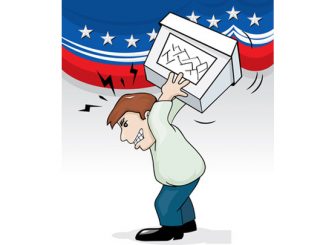

Last June five justices of the U.S. Supreme Court thumbed their noses at religious liberty.
They accomplished that without spoken comment simply by turning down an appeal by a family pharmacy in Washington state from a lower court order requiring the pharmacists to violate their consciences by dispensing an abortifacient.
So troubled was Justice Samuel Alito by his colleagues’action that, joined by Chief Justice Roberts and Justice Thomas, he issued a dissent—unusual when the court merely refuses to hear a case.
“If this is a sign of how religious liberty claims will be treated in the years ahead, those who value religious freedom have great cause for concern,” Justice Alito wrote.
He was right.
Now the U.S. Commission on Civil Rights, two members dissenting, has underlined how right Alito was. In a conflict between non-discrimination laws and religious liberty, a commission report says, non-discrimination as defined by the government wins. Although the commission lacks enforcement authority, its report unquestionably reflects an ominous, growing consensus in secular liberal circles.
Not only that, but the civil rights watchdog’s chairman, Martin R. Castro, accompanied the report’s release with a statement calling “religious liberty” and “religious freedom” frequent code words for “discrimination, intolerance, racism, sexism, homophobia, Islamophobia” and other reprehensible behavior.
This was deeply and gratuitously offensive. Some proponents of religious liberty no doubt have been guilty of intolerance, and some perhaps still are. But religious liberty itself is no more invalidated by that fact than speeding laws are invalidated by drivers who speed.
Religious liberty is part of the Constitution, embedded in the Religion Clauses of the First Amendment. By contrast, non-discrimination isn’t mentioned in the constitutional text and tortuous interpretation has sometimes been required to find a basis for it there. Justice Anthony Kennedy’s majority opinion legalizing same-sex marriage last year was an egregious instance.
But an incident back in 1783 points to the most compelling reason for concern about these matters.
At that time the papal nuncio in Paris asked Benjamin Franklin, the American representative there, to sound out the Continental Congress on the establishment of a Catholic diocese in the then-emerging new nation The Continental Congress replied that it had no “jurisdiction and power” over what the Church chose to do about that.
This was a historic turning-point. In a departure from the practice of centuries, religious freedom would be unfettered in the United States.
The civil rights commission would reverse that 180 degrees and subject religious groups and institutions—as well as individual believers—to government control for the sake of punishing behavior government deems discriminatory.
Are a Christian school that doesn’t renew the contract of a teacher who enters into a same-sex marriage or a Catholic hospital that doesn’t allow abortions being discriminatory in some pejorative sense? For those who share the commission’s views, the answer presumably is yes.
This isn’t a future threat. It’s happening now, and not just to a pharmacy in Washington state. The best-known instance to date is the HHS Mandate by which the Obama administration sought to force the Little Sisters of the Poor and other religious groups to provide contraceptive coverage, including abortifacients, in employee health insurance. The Supreme Court told the contesting parties to find a compromise, but the outcome is uncertain.
However it turns out, there’s more to come. The idea that religious liberty must give way when it conflicts with a current state-approved version of non-discrimination is a central tenet—a matter of faith, you might say—for today’s aggressive secularism.
If you value the news and views Catholic World Report provides, please consider donating to support our efforts. Your contribution will help us continue to make CWR available to all readers worldwide for free, without a subscription. Thank you for your generosity!
Click here for more information on donating to CWR. Click here to sign up for our newsletter.





